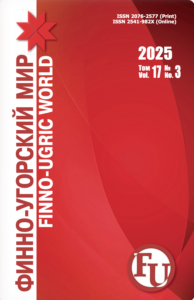PHILOLOGY
N. V. Belenov (Samara, Russia). Geographical terms used in reference to the lakes in Moksha-Mordovian dialects of the Samara Bend
O. E. Polyakov, N. V. Letkina (Saransk, Russia). Typology of phonetic systems of Mordovian languages (Moksha and Erzia) and Tatar-Mishars language
P. E. Sedova (Saransk, Russia). Communicative and stylistic role of synonyms in the Moksha language
HISTORICAL STUDIES
A. K. Gagieva (Syktyvkar, Russia). Regional features of the formation of public organizations in the Komi region in the 1920s–1930s
A. V. Kaverin, N. A. Kaverina, D. A. Masserov, I. S. Ushakov, D. A. Yanina (Saransk, Moscow, Russia). Historical analysis of agricultural development and use of the territory of Mordovia (from the Neolithic to the present day)
V. K. Abramov (Saransk, Russia). Akai Boliaev and the Peasant War of 1670–1671 on the Mordovian territory
Y. V. Karakin, T. V. Pashkova (Petrozavodsk, Russia). The role of the furnace in Karelians funeral and memorial rites and folk medicine
G. A. Kornishina (Saransk, Russia). Mordovian traditional women’s headdresses in the context of their ethnic and territorial identity
V. N. Nemechkin (Saransk, Russia). Formation and development of international standards in the field of linguistic rights of indigenous peoples: historical and legal aspects
CULTURAL STUDIES
A. V. Berezina (Ekaterinburg, Russia). Transformation of the linguistic culture of the Urals Mari in the XX – at the beginning of the XXI centuries
A. A. Osmushina (Saransk, Russia). The model of justice in Mordovian ethnic tales
EVENTS, PEOPLE, BOOKS
L. V. Kalachina (Saransk, Russia). “Woman is the world, woman is a myth” by P. D. Minichkin, a teacher of Arts
V. N. Maksimov, O. A. Sergeev (Yoshkar-Ola, Russia). Barbara T. Timofeeva – 100






















